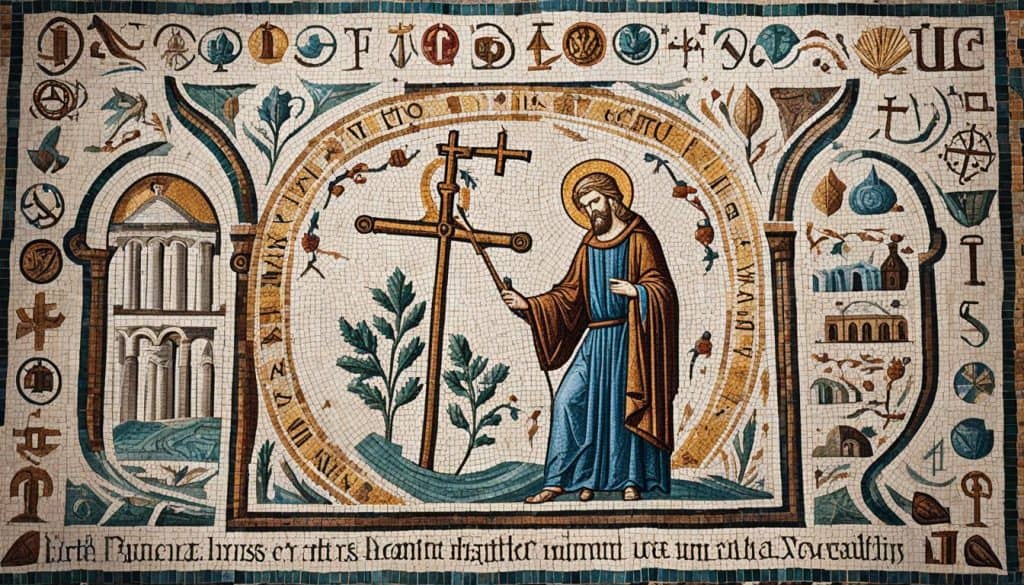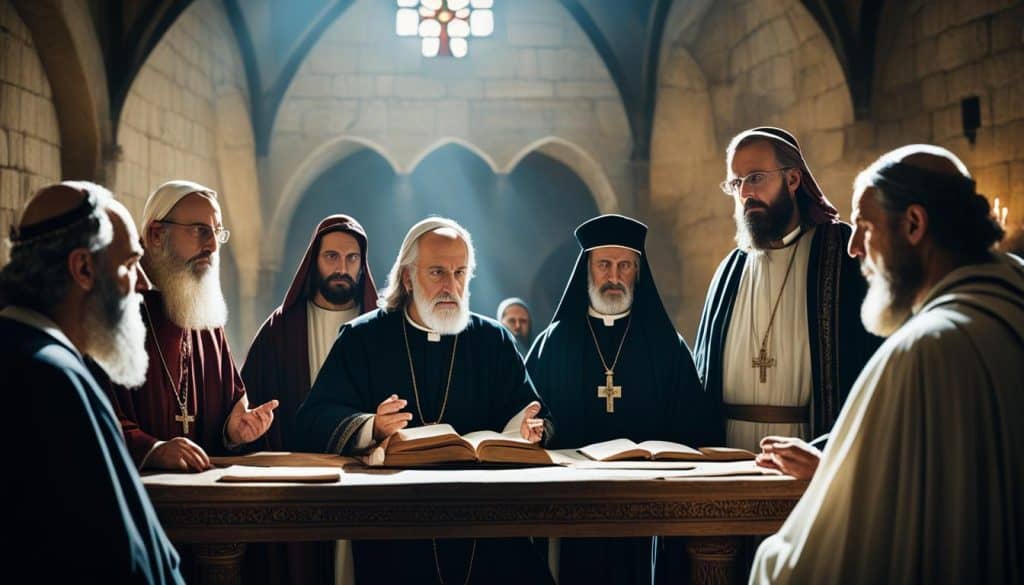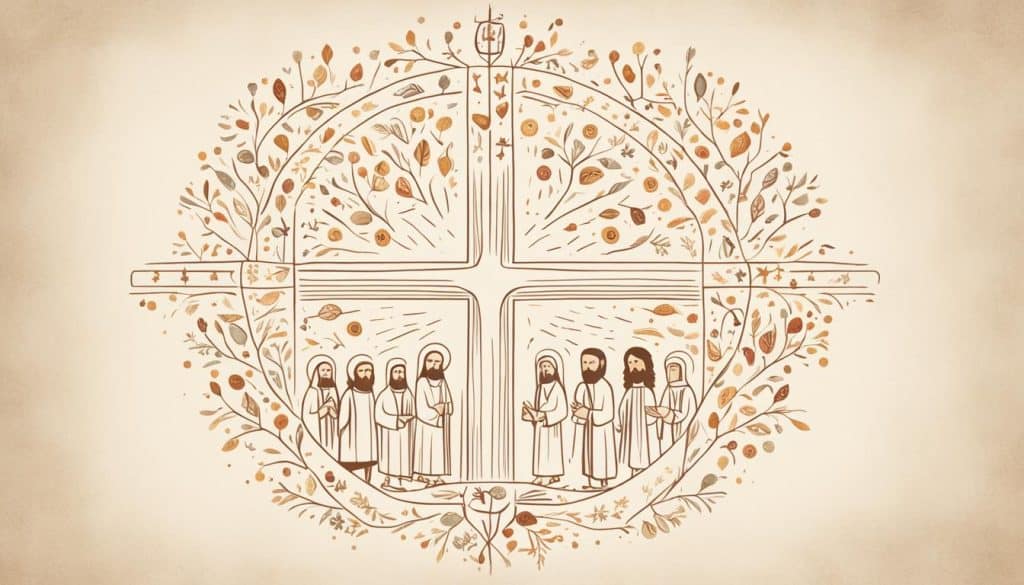Have you ever thought about how Jesus’ family helped start early Christianity? Jesus’ siblings were key in building the Christian community after he came back to life. Their change from doubters to leaders in the early Church shows a story full of change and growth.
Looking into the role of Jesus’ siblings, we see how they helped shape Christianity. Their doubts turned into strong support for the faith. Let’s dive into the exciting stories of these figures and their big impact on the faith’s growth.
The Family of Jesus: An Overview
The family of Jesus is key to understanding his life and work. The Gospels tell us about his siblings, including James, Joseph, Simon, and Judas. This shows the close family ties he had early on. In those days, family was very important for social identity and community.
Looking into the historical context helps us see how his family shaped his ministry. In a society that values family highly, family members had certain roles. For Jesus, his siblings were more than just family; they were part of his journey with its challenges and changes.
Knowing about Jesus’ family helps us grasp the challenges he faced. Being part of a tight-knit family meant carrying heavy responsibilities. The story of his siblings shows how they moved from doubters to supporters, reflecting the deep changes in their family.
| Name | Relationship | Notable Actions |
|---|---|---|
| James | Brother | Leader of the early Church |
| Joseph | Brother | Less documented, possibly involved in family business |
| Simon | Brother | Called to be a follower |
| Judas (Jude) | Brother | Authored the Epistle of Jude |
The Existence of Siblings in the Gospels
The Gospels tell us a lot about Jesus’ life, including his siblings. They show us that Jesus had brothers and sisters. This tells us about his family life and how he fit into a typical Jewish family.
In Mark 6:3, Jesus is introduced through his family ties. This makes us wonder about his authority and mission. The Gospels briefly mention his brothers and sisters, showing they supported him but didn’t overshadow his work.

These relationships remind us of the complex nature of family life. Having siblings adds depth to Jesus’ story. It shows he dealt with everyday family issues, just like anyone else.
James: The Leader Among Jesus’ Siblings
James became a key figure in the early church, leading with a focus on community. He was a leader in Jerusalem, helping believers through tough times. His work was crucial for Christianity’s growth.
James’s Leadership Role in the Early Church
James was vital in the early church. He brought together Jewish and Gentile believers in Jerusalem. His leadership was strong, guiding discussions and offering direction when it was needed.
The Significance of James’s Leadership
James played a big role in the Jerusalem Council, a key event for the church. This council dealt with important issues, showing James’s ability to keep the church united. His vision helped the church grow and shaped Christian beliefs.
| Aspect | Details |
|---|---|
| Role | Leader of the Jerusalem Church |
| Leadership Style | Inclusive and Directional |
| Key Contributions | Unifying Jewish and Gentile Christians |
| Notable Event | Jerusalem Council |
| Impact | Shaping Christian Doctrine |
Skeptical Beginnings of Jesus’ Siblings
Jesus’ siblings had mixed feelings at the start. They doubted as they saw their brother become more famous. This doubt is common in families, where knowing someone well can make it hard to believe in their big claims. Jesus’ ministry was hard for his family, especially those who knew him best.
Understanding Their Initial Doubts
The Gospels show how Jesus’ siblings doubted at first, especially in John 7:5. They found it hard to accept the man they knew as a teacher and healer. Their doubts came from fear of not understanding him, fear of what others might think, and fear of losing him to his ministry.
Family Dynamics and Ministry Challenges
Family played a big part in how they saw things. As Jesus became more known, his siblings faced challenges that tested their loyalty. They had to balance their bond with Jesus and what society expected of them. This led to questions about loyalty, faith, and where they belonged. Each sibling dealt with these issues in their own way, affecting their relationships and how they came to accept Jesus’ mission.
Change of Heart After the Resurrection
After Jesus came back to life, his siblings had a big change of heart. They went from doubting to fully believing, showing a big transformation in faith. This change deeply affected how they saw and followed Jesus’ teachings. It shows how personal experiences can change our beliefs a lot.
Transformation in Faith
The resurrection was key to this change. Seeing Jesus fulfill his promise made them rethink their doubts. This change of heart did more than just make them believe. It made them feel closer to their faith and the community around them.
Joining the Disciples in Prayer
Acts tells us that Jesus’ siblings started joining the disciples in prayer. They became part of the early Christian movement. This showed their strong commitment to praying together and being part of the church. Their active role helped them spread Jesus’ message in a strong community.

| Aspects | Before the Resurrection | After the Resurrection |
|---|---|---|
| Belief | Skepticism | Active Faith |
| Community Involvement | Isolated | Joining Disciples |
| Prayer | Minimal | Fervent Participation |
Jude’s Contribution to Early Christianity
Jude, a brother of Jesus, played a big role in the early Christian world. His writings were key in helping believers deal with tough times.
The Epistle of Jude
The Epistle of Jude is a vital letter to early Christians. It gives them hope and guidance. Jude talks about keeping faith when things get hard.
He wrote to tackle issues in the early church and keep the community strong. His words still help us today, showing us how to deal with our own struggles.
Addressing False Teachings in the Early Church
Jude’s letter is important for warning against wrong teachings that threatened the early church. He urges believers to stay true to Christian beliefs. This advice is for everyone who wants to keep their faith strong.
Jude shows us why it’s important to be careful with what we believe. In a world full of different ideas, we need to be able to tell what’s true.

| Key Themes | Description |
|---|---|
| Faith Preservation | Encouraging believers to remain firm in their faith. |
| False Teachings | Identifying and resisting misleading doctrines within the community. |
| Community Integrity | Fostering unity and authenticity among early Christians. |
| Spiritual Vigilance | Promoting discernment and awareness against deceptive influences. |
Role at the Jerusalem Council
The Jerusalem Council was a big moment for the early church. It showed how leaders made key decisions. The council talked about how to welcome Gentile converts into the church without making them follow all Jewish laws. James was a key leader who pushed for a welcoming approach.
His ideas helped shape the church’s future. By focusing on faith in Jesus, not just the law, James helped ease tensions. He set a path for how different groups could work together.

This meeting led to big changes in how the church reached out to others. Gentile believers got a letter with rules that showed the church’s openness. It proved how important it is to work together and lead well through tough times.
| Key Outcomes | Description |
|---|---|
| Inclusivity for Gentiles | Establishing that Gentile converts should not be burdened with the full Jewish law. |
| Guidelines Issued | A letter was sent to Gentile believers outlining necessary practices, fostering unity. |
| Pivotal Leadership | James’ leadership exemplified the need for decisive, compassionate guidance. |
The Jerusalem Council showed how early church leaders could adapt and solve new problems. This ability was key to the church’s growth and success.
Martyrdom of James and its Impact
The death of James is a key event in early Christianity’s history. He was a strong figure in the Jerusalem church. His sacrifice showed the high price leaders paid to spread Christianity.
Historical Accounts of James’s Martyrdom
Many stories tell us about James’s death. Famous writers like Josephus and Hegesippus talk about his important role in the Jerusalem church. He faced persecution for his strong faith and was killed because of it. These stories remind us of the tough times early Christians and their leaders went through.
The Legacy of James in Jerusalem
James’s legacy is still felt in the Jerusalem church. He brought stability during hard times, which helped the community and their faith. His followers kept his teachings alive, keeping the early Christian impact going. His strong faith still motivates people today, in both history and theology.
| Aspect | Details |
|---|---|
| Historical Figures | Josephus, Hegesippus |
| Status in Early Christianity | Respected Leader |
| Consequences of Martyrdom | Increased Persecution of Christians |
| Influence on Early Christians | Stability and Direction |
| Ongoing Relevance | Inspiration for Modern Believers |
Influence on Early Doctrine
The teachings of James greatly shaped early Christian doctrine. He stressed the importance of living a Christian life. His words guide believers towards doing good and having true faith.
Emphasis on Practical Christian Living
James said faith must show in our actions. He believed faith without actions is useless. This led early Christians to help others and show kindness.
This approach helped build strong communities. It taught them to support each other and spread love and service.
Effects on Early Christian Ethics
James’ teachings also shaped early Christian ethics. He talked about being humble, helping the poor, and being honest. These values became key for early Christians.
They made sure their actions matched their beliefs. This created a strong moral code for followers of Christ.
Perceptions of Jesus Siblings in Early Writings
The early Christian writings show different views of Jesus’ siblings. These views were shaped by the beliefs of the communities that wrote them. Sometimes, these texts make the siblings seem very important in starting the faith.
They show how close Jesus was to his siblings. It’s not just about family ties. It’s about how they were key to Jesus’ mission.
Apocryphal texts go deeper into these family stories. They tell detailed stories that often have a deep meaning. These stories might make Jesus’ siblings seem more important than the stories we know from the Bible.
These stories aim to make the community feel closer to the faith. They want to show how important it is to follow the faith.
From these writings, we see a few main ideas:
- Their roles as leaders in spreading early Christianity.
- Their struggles with doubts and eventual embrace of faith.
- Their importance in defining the community’s beliefs and practices.
Looking at both the Bible and apocryphal texts helps us understand Jesus’ siblings better. It shows how they influenced early Christian thought.
Did Jesus’ Siblings Influence His Life and Growth in His Hometown?
Growing up in a close-knit family, Jesus likely experienced the everyday relationships and dynamics between siblings, which may have shaped His understanding of human nature. In Nazareth, where jesus grew up, His interactions with His brothers and sisters could have contributed to His emotional and spiritual growth in the larger community.
Enduring Legacy of Jesus’ Siblings
Jesus’ siblings, especially James and Jude, have left a lasting mark on Christianity. Their strong faith and leadership helped build the early church. They faced many challenges but brought stability and direction to the new faith.
James led in Jerusalem, showing how early Christians should live and work together. His focus on living right and doing good changed many lives. Jude fought against false teachings, keeping the faith true. This shows how much Jesus’ siblings meant to the early church.
Today, we still feel their impact. Christians look to Jesus’ siblings for inspiration and guidance. Their work in the early church shows how vital they were in shaping Christianity. Their lives and teachings are still important to us today.
